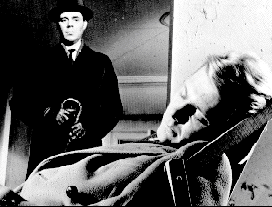 The T.S. Review is very happy, indeed, to report that Harold Pinter has today been awarded the 2005 Nobel Prize In Literature.
The T.S. Review is very happy, indeed, to report that Harold Pinter has today been awarded the 2005 Nobel Prize In Literature.Pinter - like Kafka or Beckett - defines the age he finds himself in, through the anxieties of language, and the unease of its uses, misuses and the emptiness (silence is not sufficient) between what is said and unsaid - the dialectic of human speech, and thus, society. In fact, the politics of how we say things and do things to others, surely the core concern of writing.
As a playwright, screenwriter, and antiwar poet, he has fully earned this honour, which is a refreshing surprise, and a bloody nose to both Blair and Thatcher. Coming on her 80th birthday it is a double irony - and a welcome one, given this is also HP's 75th birthday year. There were complaints in the British media not enough was being done at home to fete the great man - now there will be.
Comments